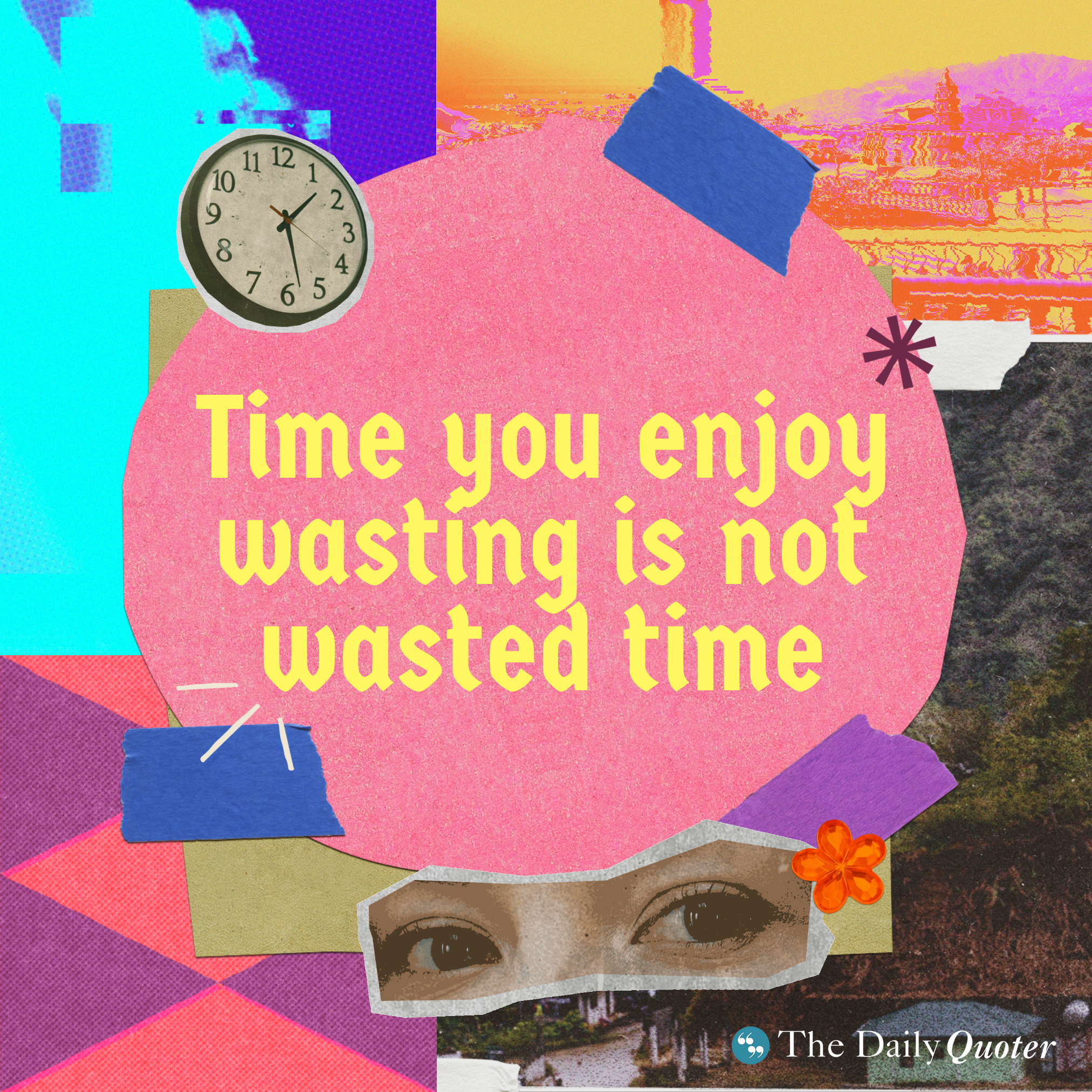#QuoteOfTheDay

The adage “Time you enjoy wasting is not wasted time” underscores the notion that time spent engaging in activities that bring us pleasure and relaxation is not inherently unproductive. While achieving goals and fostering productivity are undoubtedly valuable pursuits, prioritizing leisure and personal fulfillment is equally crucial for holistic well-being.
This quote emphasizes the importance of intrinsic motivation in evaluating our time usage. Instead of solely focusing on external metrics of success, we should consider the intrinsic enjoyment we derive from our activities. If we find fulfillment in pursuing our passions, hobbies, or simply relaxing and unwinding, then that time is not wasted; it is an investment in our personal happiness and overall well-being.
Effective time management entails striking a harmonious balance between productive endeavors and enjoyable pastimes. Overemphasis on either extreme can have detrimental consequences. Excessive productivity can lead to burnout and a diminished quality of life, while an overabundance of leisure time can foster apathy and hinder personal growth.
Self-care, the practice of nurturing our physical and mental health, is paramount. Engaging in enjoyable activities provides a respite from the demands of daily life, allowing us to recharge and regain our focus. By dedicating time to relaxation and pursuits that bring us joy, we can enhance our overall well-being and approach our responsibilities with renewed vigor.
We should not allow guilt to undermine our enjoyment of free time. Everyone needs downtime to unwind and de-stress, and guilt can hinder this essential process. Recognizing the value of leisure activities and embracing their role in maintaining a healthy balance is crucial for personal fulfillment.
To derive the full benefits of this quote, it is essential to…
The content below was originally paywalled.
identify activities that truly bring us joy. Reflect on what makes you feel happy, fulfilled, and engaged. Make time for these activities regularly, and you will reap the rewards of a more fulfilling and balanced life.
By embracing the concept of “Time you enjoy wasting is not wasted time,” we can cultivate a more enriching and holistic approach to our time. By prioritizing enjoyment, self-care, and balance, we can optimize our well-being and achieve a more fulfilling life.
In our fast-paced, achievement-oriented society, we often view time as a precious commodity to be carefully managed and utilized. We strive to be productive, efficient, and constantly striving towards our goals. However, beneath this relentless pursuit of productivity lies a subtle yet pervasive notion that time spent in activities not directly linked to our objectives is somehow “wasted.”
This perception of “wasted” time stems from a narrow definition of value, one that often equates value with achievement, productivity, and external validation. It’s a view that marginalizes the importance of leisure, relaxation, and personal enjoyment.
Yet, amidst this societal emphasis on productivity, a growing chorus of voices is challenging this conventional wisdom. They argue that time spent in activities we genuinely enjoy, even if they seem unproductive, is far from wasted. In fact, they suggest that these seemingly frivolous moments can be incredibly valuable, contributing to our overall well-being and happiness.
Bertrand Russell, the renowned philosopher, eloquently captured this sentiment in his famous quote, “The time you enjoy wasting is not wasted time.” This simple yet profound statement highlights the inherent value of leisure, asserting that time spent in activities that bring us joy is not time lost, but rather time well spent.
John Lennon, the iconic musician and artist, echoed this sentiment, stating, “If you enjoyed the time you wasted, then it wasn’t wasted time.” Lennon recognized that our subjective experiences, even those that appear trivial or insignificant, hold intrinsic value. He understood that these moments of leisure and relaxation contribute to our overall well-being and enrich our lives in ways that may not be immediately apparent.
So, what are some of the benefits of embracing “wasted” time?
Enhanced Creativity and Innovation: When our minds are free from the constraints of productivity and external pressure, they are more open to new ideas, fresh perspectives, and creative breakthroughs.
Improved Mental and Emotional Health: Leisure time provides a much-needed respite from stress and daily pressures, allowing us to recharge, de-stress, and improve our overall emotional well-being.
Deepened Self-Understanding and Personal Growth: Unstructured exploration and experimentation can lead to the discovery of new interests, talents, and aspects of ourselves that might otherwise remain hidden. These insights can foster personal growth and self-discovery.
Strengthened Connections with Others: Shared experiences, whether it’s simply conversing over a cup of coffee or enjoying a leisurely walk, can strengthen bonds with friends, family, and loved ones, creating lasting memories and deepening connections.
Balancing Productivity and Enjoyment: Achieving Harmony
While it’s crucial to recognize the value of leisure time, it’s equally important to strike a balance between “wasting” time and pursuing our goals. We must find a rhythm that works for us, allowing ourselves to indulge in activities that bring us pleasure without neglecting our responsibilities and aspirations.
The key lies in approaching leisure time not as a form of escape from our responsibilities, but rather as an essential part of our overall well-being. By embracing the wisdom of Russell and Lennon, we can rediscover the joy of “wasting” time and reap its many benefits.
So, the next time you find yourself engaging in an activity that seems “unproductive,” take a moment to reflect on the value it brings to your life. Remember, the time you enjoy wasting is not wasted time; it’s time well spent on nurturing your well-being, fostering creativity, and strengthening connections. Embrace these moments, and you’ll discover a newfound appreciation for the richness and meaning they offer.

Leave a Reply